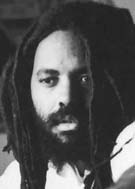![]()
Write us!
socialistviewpoint@pacbell.net
Dissent in Time of War
By Mumia Abu-Jamal
“I am an anti-imperialist. I am opposed to having the eagle put its talons on any other land.…”
—Mark Twain
 If the recent anti-Bush demo in London shows anything, it is that dissent is coming back. If the President must behave so sheepishly in the cities of America’s closest ally, then the Iraq adventure really isn’t going well.
If the recent anti-Bush demo in London shows anything, it is that dissent is coming back. If the President must behave so sheepishly in the cities of America’s closest ally, then the Iraq adventure really isn’t going well.
Although there have been spirited demonstrations in the U.S. since the start of armed conflict, they have rarely reached the size and zest of the pre-war demos. It suggests several things; a) most Americans felt funny about protesting after the armed conflict began; and b) many felt demoralized when the massive pre-war demos didn’t stop the government from going forward anyway.
Deep in the American psyche is a nationalism that is expressed as obedience to those in power. The State depends on this instinct, and draws strength from it. The great dissenters in U.S. life often had to do so against popular opinion. Also, they have been almost “whited-out” of history, so that we know little of their resistance.
Mark Twain was one of the most popular writers in America, and his fiction is at the heart of American literature. Yet, he was a staunch opponent of U.S. military adventures at the dawn of the 20th century, and proudly opposed such militarism. Naturally, the establishment questioned his patriotism. In one of his novels, A Connecticut Yankee in King Arthur’s Court, Twain gave eloquent voice to his brand of loyalty:
“You see my kind of loyalty was loyalty to one’s country, not to its institutions or its office holders. The country is the real thing, the substantial thing, the eternal thing; it is the thing to watch over, and care for, and be loyal to; institutions are extraneous, they are its mere clothing, and clothing can wear out, become ragged, cease to be comfortable, cease to protect the body from winter, disease, and death. To be loyal to rags, to shout for rags, to worship rags, to die for rags—that is loyalty to unreason, it is pure animal; it belongs to monarchy, was invented by monarchy; let monarchy keep it.”
Twain was a prominent protester against the U.S. war in the Philippines.
Most Americans recognize the name of Helen Keller, and think of her as an exemplar of the disabled. She too, was a proud anti-war activist, a feminist, and a socialist.
The great Black poet, Langston Hughes, used his artistic gifts to protest U.S. militarism abroad, and racism at home.
Those artists and thinkers whom we admire today, long after their passing, were criticized by the State because they dissented from government policy. They did not leave important issues like war, to the likes of politicians.
When we look around us, we see candidates from the Democratic Party vying for president, who sound like they are to the right of Bush! Several of them (as Senators) surrendered their Congressional war powers to the president. Several voted for the $87 billion dollars to fund the Iraq Occupation. They promise a more robust military presence there. Few have dared to actually oppose the occupation. They are caught in the trap of Bush’s making. No lawmaker in Congress has announced an intention to pull out of the Iraq debacle.
Meanwhile, a recent classified CIA document warns that the Iraqi resistance is growing and deepening. According to published accounts, the populous Shiites in the south are seriously contemplating joining the Sunnis in the center, in guerrilla attacks against the Americans. This suggests a level of nationwide resistance that the U.S. has never seen in that country.
Dissent (to paraphrase the African-American Muslim imam, Jamil Al-Amin) is as American as apple pie.
A needless war continues to be waged in Iraq; a war that never should have begun.
Dissent is growing.
—Copyright 2003 Mumia Abu-Jamal
Write us
socialistviewpoint@pacbell.net